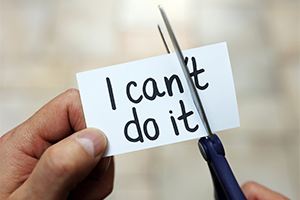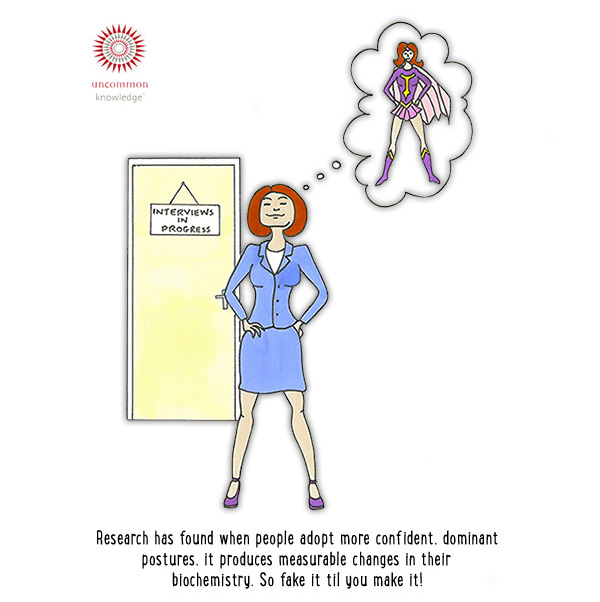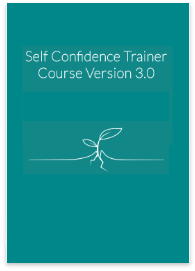5 Simple Mind Tricks To Increase Your Self-Belief
Research-based tools and techniques you can use to feel more confident when you need a boost
 Simple habits of mind can quickly improve your self belief and confidence
Simple habits of mind can quickly improve your self belief and confidenceby Joe Kao, Head Script Writer
The music had begun. There was no turning back now.
I crouched behind a wall, nervously whispering to myself, the sword at my side clanking on the gravel.
I was performing in Shakespeare's The Winter's Tale in a ruined abbey. We'd only had nine days to rehearse and my role involved some particularly weighty speeches.
A knot of anxiety tightened in my stomach. I suddenly thought, "What if you forget your lines onstage? What if your mind just goes blank?"
This certainly wasn't the most helpful mindset to have moments before beginning the show! I knew I had to get more focussed – and quickly. But how?
Finding self-belief amidst self-doubt
In any high-pressure situation where you want to be on top form, it's all too easy to start doubting yourself and your abilities.
Many people get nervous about things like job interviews and giving presentations because they have visions of themselves stumbling over their words and everything going wrong for them.
Of course, a degree of nervousness before a big event is perfectly normal.
The question is: how can you make sure that your nerves don't get the better of you? How do you stay calmly focussed and believe in yourself when you've got a dry mouth and butterflies in your stomach?
Here are 5 self-belief increasing techniques that I've found useful, both personally and for my hypnotherapy clients.
1. Broaden your physical posture
If you're nervously worrying about an upcoming event, sometimes the simplest thing to do is to change your physical posture.
Amy Cuddy, a social psychologist at Harvard Business School, found that when people adopted more confident, dominant postures, it produced measurable changes in their biochemistry.
In her research, Cuddy asked people to adopt a 'power pose', such as standing tall with their hands on their hips (sometimes called 'The Wonder Woman Pose') or leaning back in a chair and putting their feet up on a table.
After two minutes of doing this, the participants' stress hormones had significantly decreased and their testosterone levels (associated with feelings of confidence and dominance) had spiked. In other words, people actually become more confident simply by acting confident.

Of course, it's not always appropriate to put your feet up on someone's desk. But Cuddy's research found that various postures can make you feel more confident. The important factor is that you make your posture broad, wide, and open.
So even now, as you're reading these words, find out what happens if you:
- Lengthen your spine so that you're sitting more upright.
- Raise your chin by an inch or so, especially if you were looking down.
- Get a sense of your chest and shoulders broadening and opening.
- Create a half-smile at the corners of your lips and the corners of your eyes.
- Breathe deeply, smoothly, and evenly.
By doing this for just a few seconds, you might notice yourself starting to feel more relaxed, more attentive, and more confident. And if you keep going for a couple of minutes, the positive effects will become even stronger.
What's great is that you can make these kinds of adjustments in your posture anywhere, anytime.
2. Make what you're doing a choice, not a necessity
If you tell yourself that you 'have to' give a presentation or that you've 'got to' attend an important meeting, you may be inadvertently creating extra stress and anxiety for yourself.
Whenever you think that you 'have to' do something, it implies that you are powerless for it to be any other way.
But the truth is that unless you are reading this article in handcuffs whilst a group of heavily armed mercenaries transport you to their secret hideout, you almost certainly have a choice in life!
A far better approach to dealing with high-pressure situations is to remind yourself that you're actively choosing to do what you're doing.
When you tell yourself "I'm choosing to give this public talk" or "I'm choosing to take part in this competition", you put yourself back in the driver's seat of your life.
So, remember: in high-pressure situations, never think of yourself as a passive victim of circumstances. Tell yourself, "I'm actively choosing to do this because the benefits of doing so are important to me."
3. Use the power of music
Just this week, I worked with a woman who had a paralyzing fear of public speaking. Every time she tried to give a talk, she'd imagine everyone in the room dismissively rolling their eyes at her or asking her questions that she didn't know the answer to.
I guided her through a number of techniques to help her feel calmer and more confident, but the one that had the biggest impact was also, on the surface at least, the most silly and trivial.
I simply invited her to vividly imagine that her favourite upbeat song was playing in her mind as she was getting up to speak.
She immediately laughed and said that she could now vividly hear The Proclaimers singing "I'm Gonna Be (500 miles)" in her head.
She later told me that when she was next asked to give a talk at work, she found herself warmly grinning and that she felt totally different about the whole experience.
Sometimes, feeling more confident in yourself really can be that easy. So instead of excessively dwelling on what could go wrong in an upcoming event, try putting your imagination to good use.
Close your eyes for a few moments and…
- Imagine seeing what you'll see just before an important upcoming event.
- Begin to hear one of your favourite, upbeat songs playing in your mind. If you can't imagine it vividly enough, put on a pair of headphones and play it!
- Mentally run through this future event, allowing the rhythm and spirit of the music to help you form a more positive, confident attitude about the whole experience.
- Notice what's different as you think about the event now in your mind.
4. Focus on optimizing (not just surviving!)
Something I've found very helpful when it comes to giving public talks is focusing on how I can improve my performance compared to last time.
I'll often say to myself, "I wonder how many fresh ideas and creative insights I'll discover as I give this talk tonight!"
After I do this, my mind immediately starts wondering about how much fun the event will be and how much I will continue to develop and improve as a speaker.
It's all about the direction you send your mind in. If you're focussed on just surviving an upcoming event or on avoiding making any mistakes, you'll probably find yourself beginning to dread it.
But if you're focussed on how you can use this upcoming event as a chance to develop and improve your skills, you'll be sending your mind in a much more positive direction.
So, before an important event, try wondering to yourself about how many different ways you'll find yourself enjoying the experience and how many new flashes of insight you'll have along the way.
5. Let go and be a conduit for your intuition
After you've practiced something thoroughly, you develop reflexes, instincts, and intuitions related to that activity.
For example, when someone is first learning to drive, they have to consciously remember when to check their mirrors and when to use the clutch pedal. But after you've been driving for years, all of that becomes second nature to you.
So if you've trained thoroughly for an upcoming event, it's important to trust that your deeper, intuitive mind knows what to do.
This is the essence of peak performance.
A professional tennis player doesn't clutter up her mind by over-thinking each shot. She just focuses her mind and trusts in her intuitions, which allows her to instantly respond to what's happening in the game.
In the same way, if you're about to give a speech from memory, you don't need to have every word of that speech in your mind when you begin. You simply need to remember that you have prepared thoroughly and that each part of the talk will naturally lead you on to the next part.
If you've prepared hard for an important event, just remember that all of your hard work and preparation is now embedded in your muscle memory, in your intuitive mind.
You don't have to control every aspect of your performance, any more than you have to consciously remember to blink or to breathe. You are just a channel, a conduit, for a deeper intelligence within you. And all you have to do is calmly focus your mind and trust in your intuitive ability to succeed.
Better performance through intuitive self-belief
I wish I could tell you that I put every one of these tips to good use that night I was in The Winter's Tale. But sometimes in life, there's only time to do one thing.
So I simply took a deep breath and adjusted my posture so that I was broader, more upright, and more open.
Within moments, I noticed my mind become calmer and more focussed.
Seconds later, I was walking onstage, hearing the words coming out of my mouth, my brain and body instinctively knowing what to do.
And that night proved to be a truly memorable, magical experience for everyone involved.
This article was written by Joe Kao who wrote the "Boost Your Self Belief" hypnosis download.
Self Confidence Trainer course
Become an explorer of life with the Self Confidence Trainer Course. No affirmations, no 'positive thinking', no hype. Instead solid, reliable techniques from the professionals to create self confidence that lasts...







